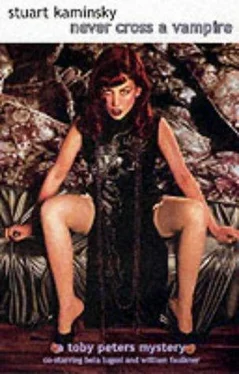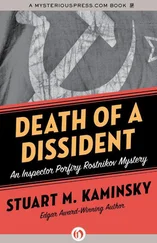Stuart Kaminsky - Never Cross A Vampire
Здесь есть возможность читать онлайн «Stuart Kaminsky - Never Cross A Vampire» весь текст электронной книги совершенно бесплатно (целиком полную версию без сокращений). В некоторых случаях можно слушать аудио, скачать через торрент в формате fb2 и присутствует краткое содержание. Жанр: Криминальный детектив, на английском языке. Описание произведения, (предисловие) а так же отзывы посетителей доступны на портале библиотеки ЛибКат.
- Название:Never Cross A Vampire
- Автор:
- Жанр:
- Год:неизвестен
- ISBN:нет данных
- Рейтинг книги:5 / 5. Голосов: 1
-
Избранное:Добавить в избранное
- Отзывы:
-
Ваша оценка:
- 100
- 1
- 2
- 3
- 4
- 5
Never Cross A Vampire: краткое содержание, описание и аннотация
Предлагаем к чтению аннотацию, описание, краткое содержание или предисловие (зависит от того, что написал сам автор книги «Never Cross A Vampire»). Если вы не нашли необходимую информацию о книге — напишите в комментариях, мы постараемся отыскать её.
Never Cross A Vampire — читать онлайн бесплатно полную книгу (весь текст) целиком
Ниже представлен текст книги, разбитый по страницам. Система сохранения места последней прочитанной страницы, позволяет с удобством читать онлайн бесплатно книгу «Never Cross A Vampire», без необходимости каждый раз заново искать на чём Вы остановились. Поставьте закладку, и сможете в любой момент перейти на страницу, на которой закончили чтение.
Интервал:
Закладка:
Stuart M. Kaminsky
Never Cross A Vampire
“Oh, my dear, if you only knew how strange is the matter regarding which I am here, it is you who would laugh. I have learned not to think little of anyone’s belief, no matter how strange it may be. I have tried to keep an open mind; and it is not the ordinary things of life that could close it but the strange things, the extraordinary things, the things that make one doubt if they be mad or sane.”
— Dr. Van Helsing in Bram Stoker’s DraculaCHAPTER ONE
A pudgy vampire with a soiled black cape sat on a coffin across from me sipping a bottle of Hires Root Beer through a soggy straw. His loose fangs kept slipping, and each sip brought a sound somewhere between an asthmatic whistle and terminal pneumonia. He was fascinating, but so were the other four black-caped vampires who surrounded my client in that damp basement. My client, wearing a conservative gray suit and a fixed, uncomfortable smile, used his cigar to keep the vampires at bay, but they weren’t to be denied, especially one white-faced woman with long raven hair parted down the middle.
“But Mr. Lugosi,” she panted, “When are you going to play a vampire again?”
Lugosi shrugged enormously, playing to his rabid audience. He was almost sixty and looked every bit of it and more. His face was puffy and white, his smile a broad V. He didn’t want to be here, but since he was, he couldn’t resist the urge to perform.
“Lou-go-she,” he corrected the woman, “Bay-lah Lou-go-she, but, my dear, that is of no importance. As to when I will play a vampire again, well, my friends,” he sighed, and the well came out “vell,” his familiar accent lying like goulash over his words. He took longer to get those last three words out than a doctor with bad news.
“One does what one must to make a living,” he went on, with eyes closed to show how the burden of paying the grocer and the milkman had forced him into artistic compromise. “I would luff to do Dracula again, but…” he pointed to the cracked gray ceiling a few feet above his head, “to do it right. Ah, I know so much more now my friends, so much more.”
“Hell,” said a short Chinese vampire with a disappointing lack of accent and sympathy, “the only things you’ve played for five years are mad doctors who get torn up in the last reel.”
“Dying,” said Lugosi with a shake of his head, “for me is a living.”
It was a punch line he had surely delivered before, but it brought no smiles from this group. Lugosi cast a secret look of exasperation at me. They weren’t going for his best material, and he wanted to be rescued, but I wasn’t ready to leave yet. I gurgled some Pepsi from my bottle, shifted on my coffin, and scooped up a handful of Saltines with my free hand.
We were in the lair of the Dark Knights of Transylvania, not very far below a fake-adobe neighborhood movie theater in Los Angeles in January of 1942. Both the theater and the neighborhood were rotting rapidly around this quintet of black-clad dreamers drooling over the memory of a ten-year-old movie, trying to savor the fantasy of evil immortality while the proof of the bankruptcy of that fantasy stood before them in the decaying form of a worn-out Hungarian actor who had seen better days and better cigars.
If they had bothered to look at me, which they didn’t, the Dark Knights of Transylvania would have seen further evidence of the mortality of the human body. In almost forty-five years of being unable to make up my mind about what I planned to be when I grew up, I had picked up a hopelessly flat nose, a face that had been polite to too many punches, two bullet scars (three if you wanted to count the exit wound of one of them), and a large but as yet still finite number of lacerations caused by gun butts, broken bottles, assorted pieces of wood, an unopened jar of Jeris hair tonic, and such worldly weapons as knives and brass knuckles. My brain is barely protected by scar tissue, and my back pops out more often than champagne corks at a Tommy Manville wedding. Such things are more or less visible to the keen eye of even your novice vampire. What couldn’t be seen was the fact that I’m a private detective with nothing in the bank but a bad credit rating, nothing in the world but a questionable reputation, and nothing on my mind but hard memories.
I had failed as a Glendale cop and a Warner Brothers security guard and I had only twenty-five bucks and an overdue bill on my office rent to show for nearly half a dozen years as a private investigator. Look at me, vampires. There are some bodies you can’t get blood out of. Amid the orgy of crackers, root beer, and Pepsi, I was trying to do the job I had been hired for by Lugosi. Someone had been playing games with him for over a month, sending messages written in animal blood through the mail saying, “He who mocks the vampire deserves his fate,” and “Respect what you represent or suffer for it,” or who ever can forget my own favorite, “Dignity or death.” It was an old story in Los Angeles. Movie people often found themselves a fan they could do without. Cecil B. DeMille had a guy who even jumped into his dining room once and ruined the cream of turnip soup. The cops locked the guy up, but he escaped and came back to DeMille from time to time like a truly irate critic.
Lugosi’s topper had been a hat box delivered to his home one morning. Inside the hat box was a cute little bat with a tiny stake through its heart.
Lugosi had shrugged this off as a sick prank. He’d pulled enough of them himself and had had them pulled on him. But Lugosi had told the tale to a fellow Hungarian over a few drinks, and the Hungarian, who was an extra at Universal, mentioned it to Boris Karloff. Karloff had called me. He was worried about Lugosi. The world was exploding. The Japanese had just hit Pearl Harbor. The Germans were marching through Russia, and everyone was scared as hell. No one else was going to worry about Lugosi. With the world melting outside your window and the front pages a series of horror stories, the bottom had dropped out of the monster movies for a while. Lugosi had hit hard times, according to Karloff. He had lost his car and his home and a lot of his dignity. Lugosi was making a small comeback, but his body and his nerves had taken a hell of a beating.
“I’m afraid, Mr. Peters,” Karloff had lisped deeply over the phone. “Bela resents what he sees as my greater success. I assure you it is only a relative success, but I seem to have adjusted much better to the inevitable life of evil into which I have been cast. Actually, I’m quite grateful to be typecast and working steadily. Would it be possible to approach Bela without mentioning me?”
With no client on the books and a stomach that echoed a cry for tacos and an occasional beer, I told him I’d give it a try. The try came the next afternoon when I called Lugosi and made an appointment, being as vague as I could about the reason. Lugosi’s house was a small frame one-story with a little grass in front where he was playing quoits with a four-year-old neighbor.
“I’m Peters,” I had told him. “Toby Peters. I’m a private investigator.”
“And you sell your surfaces door-to-door and by telephone?” he had asked with an exaggerated raising of his eyebrows.
“I understand you’ve had some trouble. Someone playing tricks that might not be funny.”
“I’ll hide. You find me,” the boy interrupted.
“No,” glowered Bela, raising the sleeve of his gray cardigan sweater to his face like a cape. The boy was neither frightened nor impressed.
“Claire couldn’t find me,” said the boy.
“Not now,” Lugosi said in mock menace.
“I’m going to the potty and having some cookies,” replied the boy, who ran toward the house next door.
Читать дальшеИнтервал:
Закладка:
Похожие книги на «Never Cross A Vampire»
Представляем Вашему вниманию похожие книги на «Never Cross A Vampire» списком для выбора. Мы отобрали схожую по названию и смыслу литературу в надежде предоставить читателям больше вариантов отыскать новые, интересные, ещё непрочитанные произведения.
Обсуждение, отзывы о книге «Never Cross A Vampire» и просто собственные мнения читателей. Оставьте ваши комментарии, напишите, что Вы думаете о произведении, его смысле или главных героях. Укажите что конкретно понравилось, а что нет, и почему Вы так считаете.












